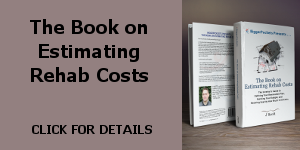Leveraging the MLS
I talk to a lot of people who wish they had access to the MLS. They want to get first crack at the new deals that pop up, they want to be able to get the lockbox codes for the foreclosures they want to look at, they want to be able to do searches for terms like “fixer upper” or “handyman special”, etc. Basically, they want access to the MLS for the sole purpose of being able to find available property that meet their investment criteria. And, more times than not, they figure out a way to get access to the MLS, and that’s what they use it for.
And, to be honest, that was my primary goal for getting access to the MLS when my wife got her real estate license early on in our investing career. But, in the time I’ve had access to the MLS, I’ve learned that finding property is probably the least important use I have for MLS data!
Instead, I’ve found that the MLS is an unbelievably great resource for helping me in other aspects of my investing — investing aspects that ultimately make the difference between failure and success in today’s world of property flipping.
Here are just a few of the things I use the MLS for that I believe will contribute to our long-term success, and if you use it similarly, it will contribute to your success as well:
- Determining what types of properties sell. In my area, there are far better deals on single family homes that have 1.5 bathrooms than on homes with 2+ bathrooms. Of course, the resale value of homes with at least 2 bathrooms is a good bit higher than homes with fewer bathrooms. While that’s to be expected (families want more than one tub/shower), it never occurred to me that homes with fewer than 2 bathrooms were essentially impossible to sell in this market. But, looking at historical MLS data, my wife and I have found that greater than 95% of homes that have sold in my area in the past 6 months have at least 2 bathrooms. Which essentially means, I should NEVER be buying smaller homes, regardless of how cheap I can get them, if my plan is to resell. This has been a huge eye-opener, and has steered us clear of some properties that seemed like amazing deals.
- Determining where to buy. When I first moved to this area, I quickly realized that there was a “good” part of town to buy real estate and a “bad” part of town to buy real estate. In the good part of town, houses were moving, foreclosures weren’t piling up too badly, and market values were holding up as best could be expected. In the bad part of town, there were more foreclosures than investors, there were very few first-time home-buyers, and market values were dropping pretty quickly. And for the most part, things haven’t changed much since then. Except, when I map out sold properties in first-time home-buyer price range for the “bad” part of town, I find that there are a couple subdivisions that are still seeing a lot of market activity, a good number of sales, and pretty good market values. Without analyzing the MLS data, I had decided to stay away from those areas completely; based on my analysis, I’ve found that I can safely expand my market to include these subdivisions, and because so many investors don’t realize that these “good” pockets exist, there isn’t much competition for houses in those areas.
- Tracking Sale Price:List Price ratios. Because I put in about 10x as many offers as I actually get accepted, it’s clear that my asking prices are often much lower than the seller’s are willing to accept. But, until an offer is accepted, I have no idea how far off my original offer was to what the seller would consider. Are my asking prices *much* lower than what sellers are willing to accept? Or are my asking prices just *a bit* lower than acceptable. Using MLS data, I can compare the List Prices (both original and final) to the eventual Sale Prices for the types of homes I’m interested in purchasing, and that gives me a very good idea of whether I can reasonably expect the banks to accept an offer 10% lower than list or 50% lower than list. This sames me the waste of time/energy in making ridiculously low offers, but also gives me enough information that I don’t offer more than I need to get my offers seriously considered.
- Finding active REO agents. A big part of being a successful investor in REO properties is getting to know the big players in the industry. For the most part, this consists of the REO listing agents and other REO buyers. The agents are the folks who control these deals, interface with the banks, and — if they like you — can help you get great deals. The other buyers are both our competition and our potential partners. While we make a point to treat everyone we work with like they are the most important person in the world (just our way of doing things), it’s nice to know which of these people really *are* the most important people in the world. Scouring through MLS data gives us a great idea of who the big players are, and allows us to tailor (and increase) our interactions with those people.
I could probably list another dozen ways we have successfully mined MLS data to benefit our business so far, but I think you get the idea. If/when you get access to the MLS, don’t forget that it’s value far surpasses just being able to find active properties.




Very helpful article J Scott. It definitely gets me started in a direction instead of just floundering about. I ran a check for the past year, looking for all the sold properties bought with cash for my town. Got a total of 3! Not really looking like a hot bed for investors.
[…] J Scott of 123flip.com said.. Here are a few ideas… http://www.123flip.com/education/leveraging-the-mls […]
J,
Again, great website! I have been literally spending hours going over your data. I have spent the last 3 1/2 months looking and bidding on REO properties, and have been unable to get that first one. I have been collecting data, similarly to what you did, and it is very beneficial to see where I have been on bids and where I need to be on the bids.
My question is about finding an Agent. The agent I have been working with specialized in REO properties and we work well together, but obviously I haven’t been successful yet. It sounds like in your post that you are going above your agent (which may be your wife, and she is ok with this) to get to the “big players”. If you are using more than one agent, how do they feel about this and how have the “big players” been at working with you from early on. I am guessing you started out slow and had to work into the “game”.
Thanks and keep up the great posts/info. (It is truly priceless).
Ron.
Hey Ron,
The only way that I’ve been successful in working with the large REO listing agents is by having my real estate license (and my wife having hers). Most REO agents aren’t going to have the time or inclination to help an investor they don’t know who isn’t licensed; they still have to show you the property, write up the offer, negotiate on your behalf, deal with inspections/appraisals for you and then deal with the closing. Must listing agents don’t want to do all this extra work for the other side of the commission; they’d rather spend that extra time listing more deals, where they make money without having to do nearly as much work as the buyer’s agent.
Listing agents like us because we don’t have to ask them to do anything. We show ourselves the property, we write up the offer, we handle writing the counteroffers and amendments, we coordinate inspections/appraisals and we handle the closing. We can do all that because we’re licensed. After the closing, we grab the agent’s commission check and the sign out of the front yard, and we drop it off at their office. They don’t ever need to go to the house again!
If you want that kind of relationship with the listing agents, I highly recommend getting your real estate license. I just don’t know how it’s possible without being licensed these days.
I think you make a great point regarding finding out what sells in the market (2+baths), but that doesnt necessarily mean you have to buy 2+baths, cant you find 1+ and just convert to a full bath?
Also you hinted at the end about dozens of ideas when interacting with the power players, do you have any article/posts explaining them?
Hey Justin –
Certainly if you can make the numbers work by adding rooms/features, there’s no reason not to do it. That said, it can sometimes be difficult to cost effectively add a second bathroom to a house that only has one. This is because the types of houses that only have one bathroom likely only have one bathroom because the footprint is very small and there is no room to easily add a second bathroom without doing a full addition — which will require things like siding, roofing, insulation, etc. All these things can get expensive, and by the time you’re finished, that 2 bathroom house has potentially cost you more than you can sell it for. That said, we’ve done this quite a bit recently with our Milwaukee properties — reconfiguring the floor plans to accommodate a second bathroom.
As for your second question, the market has changed considerably since I wrote this article. These days, it’s tough to get preferential treatment on REO deals as there is so much competition for these deals. Someone is likely to be be willing to overpay, and they’ll get the property before you will, regardless of the relationship you have with the listing agent.
Hi Scott, in regards to this comment “Listing agents like us because we don’t have to ask them to do anything. We show ourselves the property, we write up the offer, we handle writing the counteroffers and amendments, we coordinate inspections/appraisals and we handle the closing. We can do all that because we’re licensed,” I have a couple questions. First, why wouldn’t your attorney write the counteroffers and amendments? Also, doesn’t doing all of these things yourself eat up a lot of your time? If so, why wouldn’t you pay the extra commission to have an agent handle these things, and consequently, grant you more time?
Hi Amanda,
We don’t typically use attorneys for our contracts. Contract verbiage (for stipulations) is often pretty straight forward, and if we ever get into a more complex stipulation that we aren’t sure about, it’s not too hard to find templates for those. There’s only been one or two contracts that we’ve ever had to get an attorney involved with because of the complexity.
As for why we do the offers and counteroffers ourselves — the offers only take 5-10 minutes to write up (we use the same offer template for every offer), and the negotiation part of the process is so important that we don’t trust others doing it for us. There are only two or three aspects of our business that are so important that we do them ourselves, and negotiation is one of them!